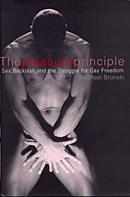
Gay/Lesbian/Feminist Bookstores Around the Country
The Mostly Unfabulous Homepage of Ethan Green
![]()


Suffer the Little Children
From Chapter 8 of The Pleasure Principle
[Editor's Note: Not only have gay people been -- and continue to be -- falsely accused of child abuse, but gay sensibility is often seen as "unhealthy" and "corrupting." The vilification of Paul Ruben and his alter-ego Pee-wee Herman in the media after the performer's arrest in a porn theater is a prime example of the suspicion under which gay culture must function.]
Pee-Wee Herman was a brilliant creation. In his two-sizes-too-small gray suit and his slightly made-up face, Pee-wee was a grotesque manchild, caught between childhood "innocence" and adult sexuality. He was a subversive parody of the epitomical fifties nerd, overly fastidious, uptight, and sexually repressed. It was this repression that shaped Pee-wee's character, for it could barely suppress his sexual energy that kept erupting in nervous giggles and snide, childish quibbles. His most frequent response to any criticism -- "I know you are, but what am I?" -- was a defensive taunt that betrayed enormous hurt and anger, as well as his own carefully constructed sexual enigma.
Pee-wee's sexuality was neither explicitly heterosexual nor homosexual, and his neither-macho-nor-effeminate affect rendered him less than manly, but not stereotypically homosexual. Because his sexual impulses manifested themselves through innuendo and childishly sniggering jokes, he palpably embodied the tension between mandated "good behavior" and sexual energy. Even when he would ask Tito, a well-built friend who came by to visit the Playhouse, if he could feel his muscles, the effect was less overt homosexual than repressed homosexual. Pee-wee Herman was a perfect comic manifestation of sexual repression. It was both funny and frightening, and not surprisingly adult viewers often found Pee-wee -- a living example of how repression distorts sexuality -- unsettling. But the irony, and the problem, was that children loved Pee-wee. Part of the appeal to children was that Pee-wee mirrored their own anxieties about living in an adult world, as well as their fears of assuming and negotiating the burdens of ill-fitting sexual and gender identities.
The Playhouse was a world of unlimited imagination. It presented a world where anything was possible, and where nothing had to be justified as productive or useful. In some ways, Pee-wee's Playhouse was a perverse parody of traditional educational programming. While the typical children's show would try to increase vocabulary by having a special word to be learned on each show, the Playhouse also had a "secret word of the day." The twist was that this was a commonly used word and viewers were encouraged to scream wildly whenever it was used. Not only wasn't this instructional, but it was probably highly annoying for parents. Pee-wee's Playhouse, not limited by didacticism or ideology, was unique in encouraging children to act out their impulses and question or even mock the world around them.
Gender, on the Playhouse, was nonheterosexual and nontraditional: The mail carrier was a young African-American woman named Rheba; one of Pee-wee's best friends was the unbearable Miss Yvonne (whose high-1950's prom gown outfits made her look like a drag queen); Cowboy Curtis, an attractive African-American man in a fouffy Western outfit, looked more like an inexperienced Midnight Cowboy than a children's show character; and Tito, a Latino bodybuilder, would occasionally stop by just to flex his muscles for Pee-wee. With its multiracial cast, Pee-wee's Playhouse was the most integrated children's show on commercial television.
Pee-wee's Playhouse was also infused with an overtly sexual sense of humor unheard of on children's TV. Once after Pee-wee showed an extreme interest in Curtis's boots, the cowboy replied, "Well, you know what they say, Pee-wee. 'Big feet, big boots.'" This was a reference to the old folk wisdom, "Big feet, big meet." In another episode, Pee-wee and Cowboy Curtis go camping and end up arguing about who was supposed to bring the "hot dogs, buns, and mustard." Even Jamby the Genie (a detached, highly made-up face in a box, with a stereotypical "queeny" voice) became sexualized when, during a slumber party, he wished up pajamas for Curtis and, after being thanked, replied seductively, "Anytime...cowboy." Every now and then, "Chairy" -- Pee-wee's talking chair -- would say, "Sit on me, Pee-wee, sit on me." The sexual material on Pee-wee's Playhouse , combined with the nontraditional gender affect, the emphasis on male sexuality, and the coded references to gay male culture, gave the show a distinctly gay sensibility.
One of the reasons that Pee-wee's Playhouse , and Pee-wee himself, caused such disconcernment among adult viewers was that the world his characters inhabited was supposedly childlike and innocent, which traditionally means not sexual. But Pee-wee displayed that "innocence" as little more than sexual repression. He created a Freudian nightmare world in which traditional developmental stages and appropriate behaviors were thrown askew and mocked. Children, being keen observers of adult hypocrisy and sham, related to the show's subversive subtext. Pee-wee acted out in the way that they wanted; he was constantly struggling against what was expected of him.
It was no surprise, then, that after the first reports of Ruben's arrest the media began dispensing advice to parents about how to deal with questions from children about it. Most of the advice took a decidedly anti-Pee-wee slant. In a Boston Globe piece, a child psychologist told parents to tell pre-schoolers: "He was doing things that were inappropriate. He went to a place that Pee-wee Herman shouldn't have gone to and he did something wrong." National television shows like Good Morning America followed suit. The undercurrent to all of this was that "innocent children were being traumatized by Pee-wee Herman." Suddenly, in shocking reversal, it was "innocent children" who were now the victims of Pee-wee Herman rather than Paul Rubens being the victim of police entrapment and an antigay media.
In all of the new reports about Ruben's arrest, however, the issue of his sexuality was completely absent. The mainstream press may not have wanted to discuss Ruben's sexuality because the year before it had taken such a vehement stand against "outing." But the decision was not an ethical one based upon his right to privacy; if that was the issue, they never would have publicized the news of his arrest. The media's decision to "in" Rubens was the result of cultural ambivalence, in which protecting the heterosexual status quo was more important than punishing a gay person. It also dispensed with Pee-wee and the Playhouse, while avoiding the more difficult discussions about children, homosexuality, and popular culture.
Pee-wee's Playhouse was an extremely popular show that spawned a whole line of Pee-wee-licensed toys and games. If the mainstream media were to openly conjecture that Paul Rubens was a homosexual, most of America's parents would have to explain to their children that their idol -- or rather the creator of their idol -- was a gay man. Rubens may not have been a model straight man, but even an imperfect heterosexual was preferable to a beloved homosexual. But while Rubens was not labeled a homosexual, it was important to address the discomfort Pee-wee's Playhouse caused many adults. The ultimate aim of the news reports and the use of psychologists to "explain" the Pee-wee scandal was to prove to the public at large that they were right to be made uncomfortable by Pee-wee Herman and Pee-wee's Playhouse --that he was, in some unspoken way, unnatural and perverted.
More from The Pleasure Principle:
- Introduction: Attacks on popular culture have everything to do with the modern gay rights movement.
- The Eroticized Male Body: With the rise of gay culture came the idea that men could be sexy too.
- The Gay Ghetto and the Idea of Culture: Visibility leads to freedom, but it also leads to backlash.
- Online Exclusive: Pleasure Wars: In this essay, author Michael Bronski traces the thoughts behind this book.

 Back
to the Stonewall Inn
Back
to the Stonewall Inn